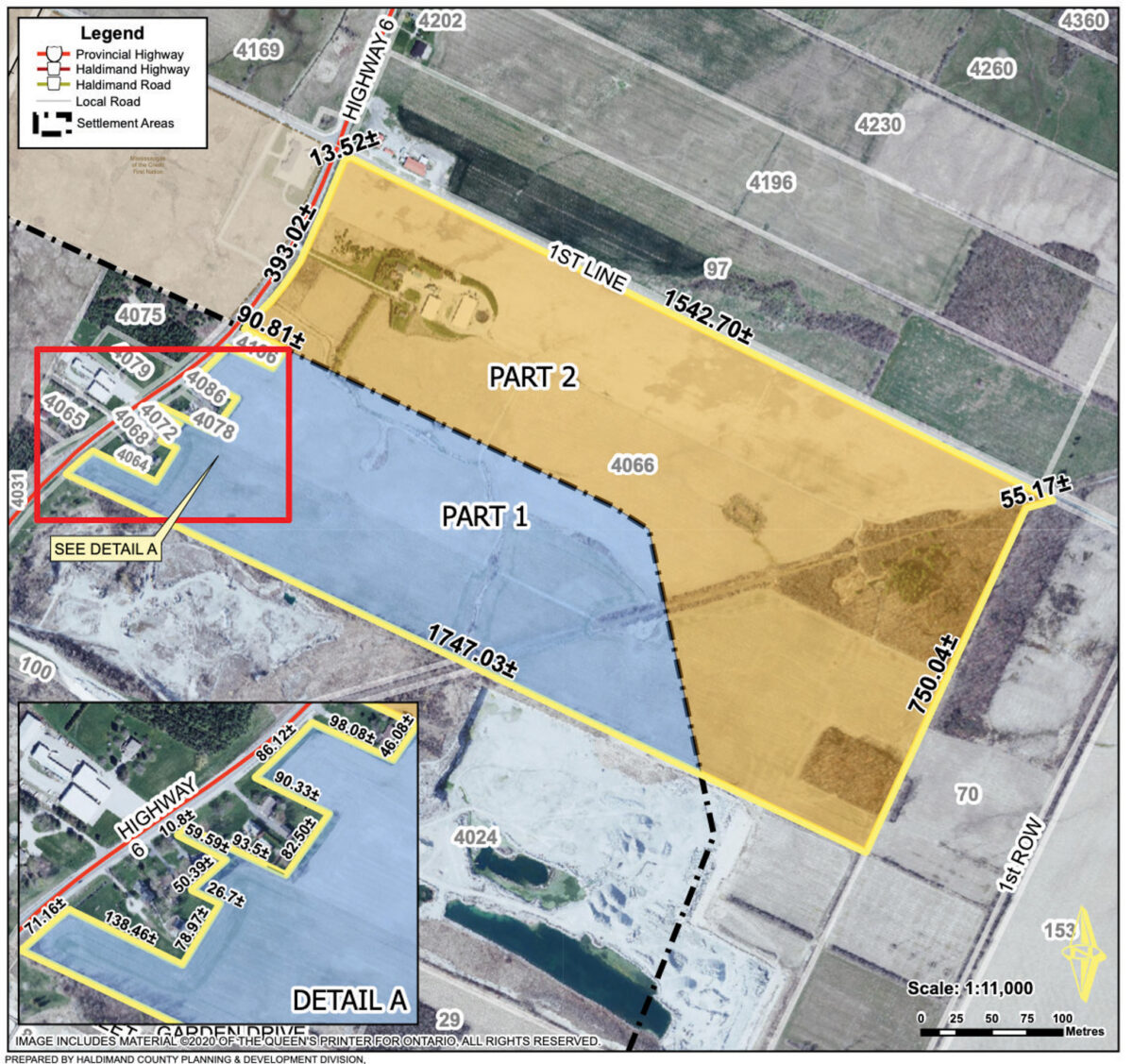HAGERSVILLE — A roughly 300-acre property on the east side of Highway 6 along the edge of Hagersville’s urban boundary is the focus of an Addition to Reserve request recently sent by Mississaugas of the Credit First Nation (MCFN) to the Canadian government.
Haldimand County staff were notified of the request in a letter from Senior Land Negotiations Officer James Rodger with the Federal Ministry of Lands and Economic Development dated May 26, 2025. In it, he advises Haldimand to provide a written reply to both MCFN and Indigenous Services Canada (ISC) detailing their support or concerns with the proposed expansion by August 25.

“While local governments do not have a general or unilateral veto regarding reserve creation proposals, Canada encourages the Haldimand County to work collaboratively with the Mississaugas of the Credit First Nation to resolve issues of concern and mutual interest,” read an excerpt from Rodger’s letter to Haldimand.
County staff created a report outlining their concerns with the expansion request. Community and Development Services Manager Mike Evers shared those concerns with Council at the June 17 meeting.
Chief among them is the loss of municipal jurisdiction over the land and the loss of tax revenue from the lands in perpetuity.
Another major concern relates to the location of the land, with about a third existing within Hagersville’s urban boundary on lands designated for employment.
“That portion of the property was factored into our growth management strategy a number of years ago and counts towards the employment land supply we are banking on to meet our employment forecasts,” said Evers.
He noted that an approved request would require a new solution in Haldimand’s next official plan update.
Land controls currently under Haldimand County’s oversight, which Evers fears losing, include Official Plan Designation, Zoning, and Site Plan Control, noting that “all disappear when land is removed from municipal jurisdiction and moves into reserve.”
Evers called the Addition to Reserve process “a policy designed to help First Nations expand their land base for a variety of needs. What is typical is needs for housing, for cultural, spiritual practices, or for infrastructure. Those are the most common.”
The complex process can take years to complete.
“On the low end, in terms of start to finish … it’s typically two years,” Evers explained. “On the high end it can take decades. The high end is usually when it’s a very complex process, there are multiple parties of interest, layers and layers of concern, very large properties.”
Haldimand has seen a “handful” of similar applications from Six Nations over the last 15 years according to Evers, none of which have reached a final decision to the best of his knowledge.
“Approval rests at the federal level,” said Evers, who noted that ISC’s role in the process is to serve as a negotiations aid if needed, but the two parties are encouraged to work together on a resolution.
Evers also noted that before the expansion might come to pass, Haldimand would need to come to terms with MCFN on a compensation plan that covers the loss of current and future tax revenue, in addition to agreed upon land use controls such as setbacks, height, and a commitment from MCFN to ensure they would put measures in place to enforce land use controls over time.
Ward 3 Councillor Dan Lawrence said that MCFN have traditionally been good working partners who “negotiate in good faith,” but added that Haldimand would likely require federal assistance to navigate the process and ensure that any potential future uses of the land comply with existing nearby land uses in Hagersville.
Mayor Shelley Ann Bentley asked for confirmation that while the process was underway, MCFN would still need to comply with Haldimand’s development requirements should they submit a proposal to begin work on a potential development on the lands ahead of their request being granted.
“That’s correct,” said Evers. “Until such time as lands are added to a reserve, even if the application process has been initiated, they’re still within municipal jurisdiction, which means official plan designation, zoning, site plan control, taxation, etc. all still apply.”
He said any MCFN development proposal would be treated like an application from any other developer.
“Depending on what type of proposal might be put forward, I think that would dictate the degree to which we would negotiate something, or whether it would be more just us setting certain conditions of development,” continued Evers. “Regardless of what gets put in front of us, we would work back and forth in good faith as we would any developer.”
County staff recommended that the list of concerns be sent out, and should ISC approve the request, it be conditional on a list of items ranging from ensuring all outstanding taxes on affected properties have been paid in full and that successful negotiations have taken place between Haldimand County and MCFN, leading to an agreed upon planning framework for future use of the lands.
Council voted unanimously in favour of proceeding as recommended. Stay tuned to The Press for updates as available.





